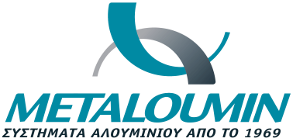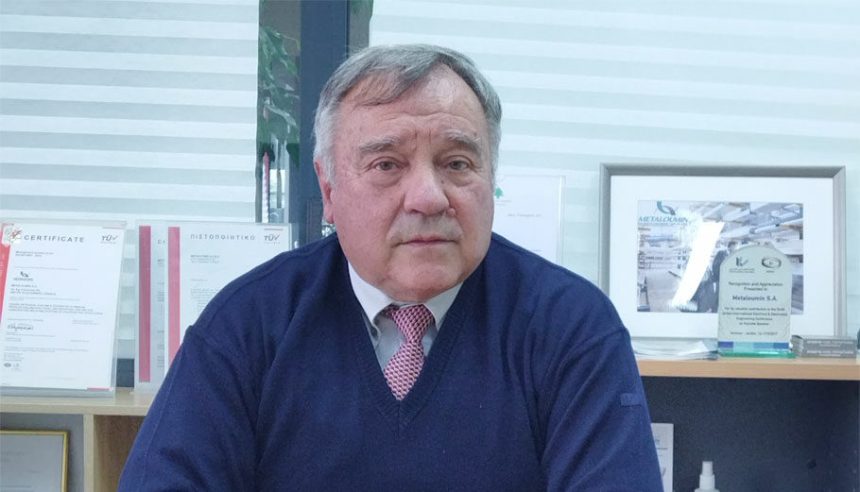A factory energy upgrade bill, will start by year-end. Landscaping and environmental upgrades are already in the works, through either already completed, or scheduled investments. Planned in coming years, are important investments in new mechanical equipment (new press), and iron-forming machines (stranding), as well as elevation of related buildings and warehouses.
METALOUMIN was founded in 1969. In 2009, it expanded into the photovoltaic installation support systems market, for field, and industrial and residential roofs. As of 2019, it was the only Greek company designing and manufacturing single axis solar Tracker mountings, which improve energy production by up to 25%, compared to fixed supports.
METALOUMIN President, Mr. Kostas Kyriazis, explained that the metal extrusion sector of the economy experienced unprecedented conditions for about two years, during the CoViD-19 pandemic. The company however, rode an upward course, even with unstable macroeconomic conditions. The firm’s exemplary endurance was attributed to new product and technology development and quality, and the company’s own enterprising vigor.
Eventually, overall conditions became difficult for the industry. As Mr. Kyriazis said: “At first, post-coronavirus high demand, coupled with limited raw material availability due to Chinese suppliers’ ban (the latter accounted for a rough 50% of 2021 world production), led to a price-increase rally. For example, while in January 2021 the international price of aluminum was at the 2,000 $/tn level, in March 2022 it reached 3,984 $/tn” (source: London Metal Exchange).
With added increasing energy and transportation costs – both being significant price drivers – the industry could have risked a production decay. In addition, market consumption remained sluggish, because of anticipated winter and energy cost insecurity, and the ensuing burdens that will face households and businesses”.
On 2022 industry exports, Mr. Kyriazis stated that “in the first nine months, figures indicated a near-10% export activity decrease, compared to the same 2021 period (source: Hellenic Aluminum Association). Although this was the actual broader industry view, published data showed that METALOUMIN soared, crediting product quality, superior service provisions, adherence to schedule, and individualized project treatment, all in addition to solid systems guaranties provided”.
Predictions
“METALOUMIN’s 2021 turnover grew by 57.9%, closing at 21,223,000 euros,” said K. Kyriazis. “A similar outcome is expected for 2022, since the first nine months already marked a 50.9% sales increase, compared to last year’s same period. 2022 will be the 7th consecutive year of METALOUMIN double-digit growth rates. As noted, the impressive advance in an otherwise unstable environment, was largely due to METALOUMIN’s commitment to quality, and the development of new products and technologies.”
According to the company’s president, “an ongoing pivotal factor for the development of the firm is its human resources. Of all employees, 42% hold university degrees, including 83% polytechnic school graduates”. Regarding company’s management team, Mr. Kyriazis added that “management applied a development and update plan, which increased market share, and solidified the reputation of a most reliable, specialized PV support system and architectural profile manufacturer in the Greek and international market, honored with large national and international project assignments”.
Aluminum extrusion industries also benefited from the construction boom and building energy upgrade programs. “Coming out of the coronavirus crisis, there was a significant increase in construction activity. This, combined with the country’s excellent performance in tourism, significantly increased market demand for aluminum frames “, said Mr. Kyriazis.
“In recent years, subsidy programs of the “Exoikonomo” type, further raised industry investment. In addition, people fully understood that elevated energy expenditure demands, and adherence to environmental protection principles, are best served only through modern technology uses. Accordingly, markets sought power autonomy, with construction of PV units on private or public building roofs, and corresponding subsidy programs, which expanded to include eligible energy upgrade subsidized interventions, and construction of PV roofs”.
According to K. Kyriazis, “Exoikonomo” type programs amplified the market significantly, enabling consumers to energy-upgrade their buildings. Occasional financial costs due to subsidy disbursement delays, were covered by field professionals, and programs continued, offering new energy upgrade possibilities. In conclusion, certainly, government intentions to simplify procedures and speed up disbursements, were favorably noted.”

